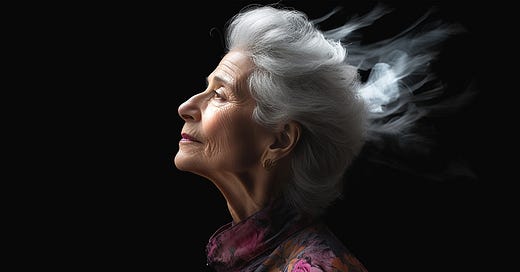Lucidity is a frank exploration of the power of music on memory
On Site Opera's production of Lucidity is proof that the opera medium can tell a story of common experience in a more impactful way than any other.
Lucidity. Clearly going to be different. Dave Eggar, cellist in the five-piece American Modern Ensemble orchestra wore a cap. The audience was seated on stage looking out. Eggar and his mates were in the stalls, looking in.
One of those mates was Brandon Williams, percussionist, who seemed to have raided the Good Hands Drum Shop on West 30th Street and brought all the contents with him. He raced about twirling a selection of mallets, sometimes three in each hand ready to advance frequently, with menaces, towards an enormous xylophone. And other devices, origin uncertain.
Composer, Laura Kaminsky, was clearly set on providing an innovative sound world for her second opera brought to life in a co-commission by New York’s On Site Opera and Seattle Opera.
The action was in the auditorium, the stalls, the gallery. Spare settings were spotlit in different areas as scenes amongst the seats unfolded. Also, front stage, where steps lead up from the auditorium.
The effect was unsettling. Meant to be. This was opera inside-out. I felt I was being invited into the minds of the performers and their stories. All the mechanics and plumbing of a small opera house were on display. Characters made entrances and exits either through the auditorium or well-worn doors stage right and left.
Lucidity, from composer Laura Kaminsky and librettist David Cote, is a frank exploration of the power of music on memory. And the influence it still exerts when abandoned for either an alternative career or lifestyle choice. Each of the characters has a different story to tell, based on the impact music has had on their lives.
We were not watching. We were complicit. Almost able to reach out and touch the singers. As this was the work’s world premiere Manhattan’s opera cognoscenti, from establishment figures, through dedicated supporters to music students made up a large percentage of the full house.
Isn’t that Peter Gelb, General Manager of the Met, perching anonymously at the end of a row? For the record, the answer is ‘Yes’. An acknowledgement of the significance of this On Site Opera production. Maybe he had popped downtown for tips on mounting opera in line with a tight budget.
As I looked around the audience, it was apparent that for most this assertion of the influence music has on lives lived would be almost autobiographical. At some level or other, this was to be our story.
And this is the story. Lucidity’s tightly written, non-repetitive and clear as crystal libretto is penned by David Cote, a journalist, critic, and experienced librettist whose four previous operas, Three Way, The Scarlet Ibis, Fade and We’ve got our Eye on You, have been favourably received across the USA.
This work poses the questions: Why does music have such a profound impact on the care of individuals suffering from Alzheimer’s? What impact does it have on the families and friends who care from them? And how has the course of those individuals’ lives been affected in different ways? Full synopsis here. I shall stick to the essentials.
The central character is Lili, a retired singer and composer experiencing early dementia, sung by soprano Lucy Shelton, 80 years young and clearly not suffering from early onset anything. In a career that has so far spanned nearly seven decades Shelton has focused on new repertoire.
She was completely at home with Kaminsky’s frequent use of sprechstimme – spoken music – having used the technique frequently in performances of Schoenberg’s Pierrot lunaire. And still capable of rising to melodic heights when the score required.
Lili was cleverly directed by Sarah Meyers, Shelton morphing seamlessly between moments of startling insight into her past career and tender scenes of self-awareness when her declining faculties were getting the better of her.
The opera was peppered with instances of Meyer’s sharp eye. An aria where both singers are voicing lyrics that talk of spanning a divide, then, seated in the stalls, stretching across the aisle to hold hands. Poignant. Meyer directed to the music. Sounds obvious, but too many directors treat the music as peripheral.
Caring for Lili is her adopted son, Dante, sung by American baritone, Eric McKeever. His character is troubled by an abandoned career as a pianist, ostensibly to look after Lili. As the action unfolds it becomes clear that his leaving music was a cop-out. Dante is conflicted and haunted by failure.
Sunny is a young clarinettist, working on the side for Dr Klugman, a researcher investigating the relationship between music and memory. Lili is her case study. She plays for her and becomes fascinated with the singer’s back story, especially an unfulfilled career as a composer, with many unfinished works “on the shelf”.
Klugman, sung by Blythe Gaissert, a rich mezzo soprano, like Dante has also abandoned a career in music, in her case for her profession. It turns out later in the action that they were close in student days.
The clarinettist, Sunny, soprano Cristina Mariá Castro, decided to have an abortion as she felt combining motherhood with a musical career was beyond her capabilities. Castro is a Puerto Rican born natural, with a bubbly character that matched her role name, Sunny.
No, she did not also play the clarinet. That was subtly done by a lookalike double from the ensemble, Yasmina Speigelberg who blended with the singer while never intruding. As did pianist Kyle Walker when he doubled with Dante, the piano playing son.
Kaminsky and Cote risked embarking on a therapy lesson but avoided the trap adroitly. The characters’ own stories were intriguing, and the overarching plot line of Lili’s dementia experience was the glue that held it all together. The 90-minute one act experience whizzed past.
There is no “so that’s all right” happy ending moment. Nor, as in most of Puccini’s works, does anyone die of tuberculosis. When they’re not jumping off parapets. Yes, I’m off to see Tosca sung by ultra-soprano Lise Davidsen at the Met tonight!
But what is achieved is a better understanding of the role of music and our perception of sound, which we hear from the heartbeat of the mother in the womb to the voices of relatives and friends around our deathbeds.
The moments when Lili is reunited with her uncompleted score and Sunny is given a glorious, soaring aria in the closing stages to describe her altered state of mind, are conclusive answers to the questions posed at the beginning of the piece.
Conducting the ensemble, which also included Nikita Mozorov, violin, was Geoffrey Macdonald, On Site’s Music Director for nearly a decade. The score was illuminated by Kaminsky’s recurring references to Schubert’s atmospheric Lied, The Shepherd on the Rock.
She quoted some passages directly. Listening to the haunting shepherd’s laments echoing from the valley below chimed movingly with Lili’s search for echoes form her past life.
Kaminsky’s musical voice is distinctive, but not so cutting edge that it would leave a non-expert audience member floundering. She peppers her arresting work with many lyrically beautiful passages and arias.
Her previous 2019 opera, As One, telling a transgender story through the eyes of the character’s split personality is equally direct, relevant and moving. What story of today will she turn to next?
On Site Opera has, since 2012, produced twenty-four full opera productions, many versions from the main repertoire, but now four world premieres. It makes use of unusual venues around New York and focuses on audience engagement. The downtown, Grand Street Abron Arts Center theater fulfilled both criteria.
This production will be widely adopted by other companies, as has As One – over 60 productions with wide international reach. Artistically sound, a manageable ensemble and cast, infinitely flexible in staging, and with the potential to seek out a local loved soprano from another era and bring her back to her audience.
If On Site were to co-produce Lucidity with Scottish Opera a natural candidate for Lili would be Greenock born Linda Esther Gray, now an opera coach in Surrey. I remember her fondly from my early opera days in the 1970’s. Now, where’s Alex Reedjik’s mobile number?
On Site Opera’s Lucidity is proof that the opera medium today can tell a story of common experience and personal dilemmas in a more impactful way than any other. I’m not surprised their run of Lucidity is a total sell-out. I was even hustled for a ticket on Grand Street.






